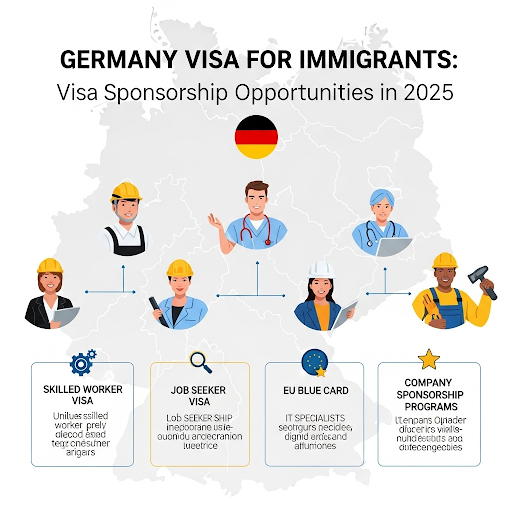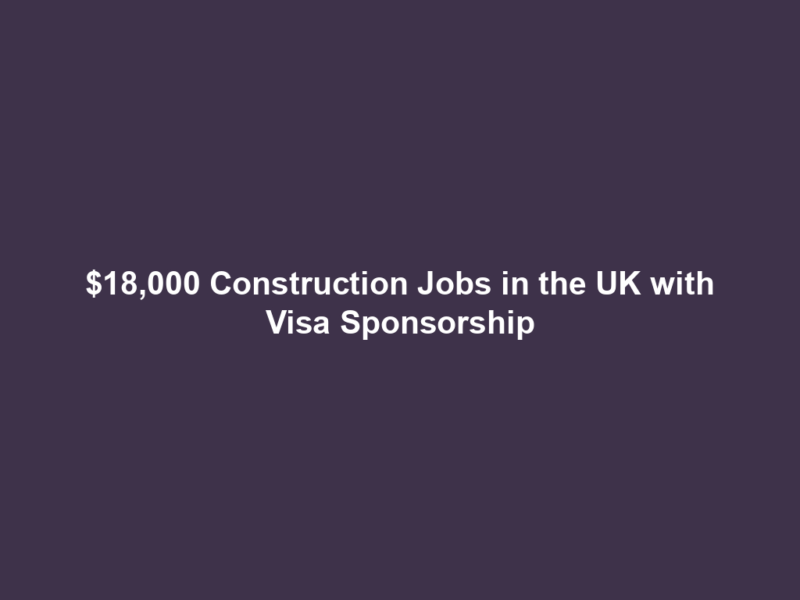Germany, Europe’s economic powerhouse, faces a critical labor shortage projected to reach 7 million unfilled jobs by 2035, according to the Federal Employment Agency (BA). With a thriving economy driven by manufacturing, technology, healthcare, and renewable energy, the country is actively recruiting skilled workers from around the world.
In 2025, Germany’s updated Skilled Immigration Act and streamlined visa processes make it an attractive destination for non-EU professionals seeking visa sponsorship jobs. These opportunities span diverse sectors, offering competitive salaries, robust social benefits, and pathways to permanent residency.
This comprehensive guide, explores the landscape of visa sponsorship jobs in Germany for 2025, detailing the job market, visa types, application processes, requirements, benefits, challenges, and strategies to secure employment.
Drawing on data from the BA, the “Make it in Germany” portal, and 2024-2025 labor market trends, it provides a roadmap for global talent to build rewarding careers in Germany.
Visa sponsorship jobs are critical for non-EU nationals, as they provide the legal framework to work in Germany through employer-supported work permits.
Unlike systems in countries like the USA, German employers provide a job offer or contract that enables candidates to apply for visas independently, with streamlined processes for shortage occupations.
With over 1.2 million job vacancies reported in 2024, including 900,000+ offering visa support via platforms like EURES, Germany is a prime destination for professionals in IT, healthcare, engineering, and skilled trades.
This guide equips you with the tools to navigate the job market, secure a sponsored role, and thrive in cities like Berlin, Munich, or Hamburg.
The Job Market for Visa Sponsorship in Germany 2025
Germany’s labor market is characterized by a high demand for skilled workers, driven by:
- Economic Strength: A €4.18 trillion GDP, with key industries like automotive (Volkswagen, BMW), technology (SAP, Siemens), and pharmaceuticals (Bayer) requiring talent.
- Labor Shortages: Over 1.4 million vacancies projected for 2025, with 400,000 in healthcare, 300,000 in IT, and 250,000 in engineering, per BA data.
- Green Transition: €500 billion invested in renewable energy by 2030, creating jobs in wind, solar, and energy-efficient construction.
- Aging Population: A shrinking workforce, with 20% of Germans over 65, necessitating foreign talent in healthcare and social services.
- Digital Transformation: 70% of companies adopting AI and automation, boosting demand for IT professionals.
The BA’s 2025 shortage occupation list includes roles like software developers, nurses, mechanical engineers, and skilled trades (e.g., welders, carpenters), all eligible for visa sponsorship. Salaries vary by sector:
- IT: €55,000–€90,000 (software developers, cybersecurity experts).
- Healthcare: €40,000–€70,000 (nurses, doctors).
- Engineering: €50,000–€85,000 (mechanical, civil engineers).
- Skilled Trades: €35,000–€55,000 (electricians, plumbers).
Major employers offering visa sponsorship include:
- Technology: SAP, Siemens, Deutsche Telekom, and startups like N26.
- Healthcare: Charité, Helios Kliniken, and regional hospitals.
- Engineering/Construction: Hochtief, Bilfinger, and Deutsche Bahn.
- Manufacturing: Bosch, Volkswagen, and BASF.
- SMEs: Small businesses in rural areas, especially in Bavaria and Saxony, often sponsor due to local shortages.
Job boards like Arbeitnow, EURES, and StepStone list 950,000+ visa-supported roles, with 25,000+ in IT and 15,000+ in healthcare. English-speaking jobs are common in tech hubs like Berlin, but German proficiency (A2-B1) enhances prospects in other sectors. The next section outlines visa options and eligibility.
Visa Types for Sponsored Jobs
Germany offers several work visas for non-EU professionals, tailored to qualifications and job offers. The 2024 Skilled Immigration Act simplifies these processes, prioritizing shortage occupations. Key visa types for 2025 include:
EU Blue Card (Blaue Karte EU):
- Eligibility: A recognized university degree or vocational qualification (e.g., 3-year apprenticeship for trades), plus a job offer with a minimum salary of €45,300 (2025 threshold for shortage occupations) or €58,400 (other roles).
- Duration: Up to 4 years, renewable, with permanent residency possible after 21 months (with B1 German) or 33 months.
- Benefits: Family reunification, EU mobility, and fast-tracked processing (2-4 weeks).
- Fee: €75-€100.
Skilled Workers Visa (Fachkräftevisum):
- Eligibility: A vocational qualification or degree equivalent to German standards, plus a job offer. No minimum salary threshold for shortage occupations.
- Duration: Tied to the employment contract, renewable up to 4 years, with permanent residency options.
- Benefits: Flexible for trades and professionals, supports family reunification.
- Fee: €75.
Job Seeker Visa (Visum zur Arbeitsplatzsuche):
- Eligibility: University degree or vocational qualification, proof of funds (€1,027/month for 6 months), and health insurance.
- Duration: 6 months to find a job, non-renewable but convertible to a work visa upon employment.
- Benefits: Allows in-country job hunting, ideal for networking.
- Fee: €75.
Training/Qualification Visa (Visum zur Anerkennung ausländischer Qualifikationen):
- Eligibility: Professionals needing gap training to align qualifications with German standards, with a training contract.
- Duration: Up to 2 years, convertible to a work visa upon recognition.
- Benefits: Supports skill alignment, often employer-funded.
- Fee: €75.
IT Specialist Visa:
- Eligibility: IT professionals with 3+ years of experience, even without a degree, plus a job offer with a €50,760 salary (2025 threshold).
- Duration: Up to 4 years, renewable, with permanent residency options.
- Benefits: Targets tech talent, fast-tracked for shortage roles.
- Fee: €75.
The EU Blue Card and Skilled Workers Visa are most common for sponsored jobs, with 150,000 work visas issued in 2024, including 40,000 for shortage occupations. The next section details eligibility and requirements.
Requirements for Visa Sponsorship Jobs
To secure a visa-sponsored job, candidates must meet specific criteria, ensuring they are qualified and compliant with German immigration laws. Requirements vary by role but include:
Qualifications:
- IT: Degree in computer science or equivalent experience (e.g., 3 years as a developer for IT Specialist Visa).
- Healthcare: Nursing diploma or medical degree, recognized by German authorities (e.g., Federal Ministry of Health).
- Engineering: Degree or vocational qualification in mechanical, civil, or electrical engineering.
- Skilled Trades: 3-year apprenticeship or equivalent (e.g., Certificate III for electricians, plumbers).
- Recognition by the Central Office for Foreign Education (ZAB, €200-€600) or relevant chambers (e.g., Handwerkskammer for trades) is required, taking 2-4 months. Non-equivalent qualifications may need gap training.
Job Offer:
- A formal employment contract specifying role, salary, and duration, aligned with prevailing wages (e.g., €25/hour for nurses, €30/hour for developers).
- Employers must register the job with the BA, confirming no suitable EU candidates are available.
Language Skills:
- IT: English fluency often suffices in tech hubs like Berlin, but A2 German boosts employability.
- Healthcare: B2 German for nurses and doctors, due to patient interaction, per Federal Nursing Act.
- Engineering/Trades: A2-B1 German for site communication and safety. Language certificates (e.g., Goethe-Institut, €100-€300) strengthen applications.
- Experience:
- 2-5 years of relevant experience, verified by employer references or work certificates.
- Specialized skills (e.g., cloud computing, surgical expertise, renewable energy installations) increase competitiveness.
Visa Eligibility:
- Valid passport (6 months beyond intended stay).
- Clean criminal record (police certificate).
- Health insurance (statutory or private, €100-€200/month).
- Proof of funds (€1,027/month) for job seeker visas or initial relocation.
Age and Health:
- No strict age limit, but candidates under 45 are prioritized for permanent residency.
- Physical/mental fitness for roles, with health checks during visa processing.
These requirements align with Germany’s focus on skilled labor, with streamlined processes for shortage occupations under the 2024 Skilled Immigration Act.
The Job Search and Visa Application Process
Securing a visa-sponsored job involves job hunting, application preparation, and visa processing. Below is a detailed roadmap for 2025.
Step 1: Research and Find Jobs
- Job Portals:
- EURES: 1,400,000+ jobs, including 900,000+ with visa support. Search “visa sponsorship” for 25,000+ roles.
- Arbeitnow: 15,000+ English-speaking jobs, including 5,000+ with visa support.
- Make it in Germany: 250,000+ vacancies, targeting non-EU professionals.
- StepStone/Indeed: 10,000+ visa-sponsored roles across sectors.
- Company Websites: SAP, Helios, Hochtief, and Bosch list visa-supported roles.
- Recruitment Agencies: Manpower, Randstad, and Michael Page specialize in sponsorship jobs.
- Networking: Join LinkedIn groups (“Jobs in Germany”), expat forums (Reddit’s r/germanyjobs), and virtual job fairs (EURES Job Days).
Step 2: Prepare Application Materials
- Resume: German-style CV (1-2 pages), highlighting qualifications, experience, and skills. Include a photo and contact details.
- Cover Letter: Tailored to the employer, emphasizing relevant expertise and visa eligibility.
- Documents: Translate qualifications, references, and certificates (€50-€100/document). Obtain ZAB recognition if required.
Step 3: Apply and Interview
- Applications: Submit via portals or company websites. Follow up within 7-10 days.
- Interviews: Expect technical questions (e.g., “How do you optimize code?” for developers, “How do you handle patient emergencies?” for nurses) and visa queries. Practice German/English responses. Remote interviews require stable internet.
- Job Offer: The employer provides a contract, initiating the visa process.
Step 4: Apply for a Visa
- Choose Visa Type: EU Blue Card, Skilled Workers Visa, or Job Seeker Visa based on qualifications and offer.
- Gather Documents:
- Employment contract
- Passport and photos
- Qualification recognition
- Language certificates
- Police certificate
- Health insurance
- Application form
- Submit Application: Book an embassy/consulate appointment (€75 fee). Attend an interview (5-10 minutes) on job details and intent.
- Processing Time: 4-8 weeks, prioritized for shortage occupations.
- Entry: Enter Germany within 90 days, registering with the Foreigners’ Office within 14 days.
Step 5: Start Employment
- Employers provide onboarding, including safety training (DGUV for trades) and tools. Begin work within 10 days.
Engaging a migration consultant (€500-€2,000) can streamline the process, though self-application is feasible.
Benefits and Responsibilities
Visa-sponsored jobs offer significant benefits, balanced by responsibilities.
Benefits
- Salaries: €35,000–€90,000, depending on sector, with overtime adding 10-20%.
- Relocation Support: Employers like SAP and Helios offer €1,000-€5,000 packages (flights, housing, visa fees).
- Social Benefits: Health insurance (€100-€200/month, employer-shared), pensions, and unemployment benefits.
- Career Growth: Employer-funded training (€500-€3,000) and promotions (e.g., senior developer, head nurse).
- Permanent Residency: Possible after 21-48 months, with 20,000+ non-EU workers gaining PR in 2024.
- Lifestyle: Access to Germany’s culture, festivals, and cities like Berlin and Munich.
- Family Reunification: Spouses and children join with access to education and healthcare.
Responsibilities
- Visa Compliance: Work only for the sponsoring employer; overstaying risks a 3-year ban.
- Performance: Meet workplace standards (e.g., DIN for engineers, VDE for electricians).
- Taxes: Pay 14-42% income tax (€10,000-€30,000 on €60,000 salary). File via ELSTER.
- Cultural Adaptation: Embrace punctuality and direct communication. Learn German for integration.
- Reporting Issues: Report violations to BA or unions (e.g., IG Metall), with protections.
Challenges and Strategies
- Qualification Recognition: Start ZAB process early or apply for a training visa.
- Language: Reach A2-B1 German via Goethe-Institut (€200-€500) or free apps.
- Competition: Highlight niche skills (e.g., AI, oncology) and target SMEs.
- Living Costs: Budget €2,000-€3,500/month; seek housing support.
- Scams: Verify employers via BA’s database; avoid upfront payments.
FAQs: Visa Sponsorship Jobs in Germany 2025
1. What are visa sponsorship jobs in Germany?
Visa sponsorship jobs are employment opportunities offered by German employers to non-EU nationals, accompanied by a job offer or contract that enables the worker to apply for a work visa.
Unlike some countries (e.g., USA’s H-1B), German employers do not directly “sponsor” the visa but provide the necessary documentation (e.g., employment contract) for the candidate to apply for a visa through a German embassy or consulate.
These jobs are common in shortage occupations like IT, healthcare, engineering, and skilled trades, with over 900,000 visa-supported roles listed on platforms like EURES in 2025.
2. Which sectors offer the most visa sponsorship jobs in Germany in 2025?
Germany’s labor market has a high demand for skilled workers across several sectors, including:
- Information Technology: Software developers, cybersecurity experts, and data scientists (25,000+ roles, €55,000–€90,000/year).
- Healthcare: Nurses, doctors, and caregivers (15,000+ roles, €40,000–€70,000/year).
- Engineering: Mechanical, civil, and electrical engineers (10,000+ roles, €50,000–€85,000/year).
- Skilled Trades: Electricians, plumbers, and welders (8,000+ roles, €35,000–€55,000/year).
- Manufacturing and Logistics: Technicians and warehouse managers (5,000+ roles, €35,000–€60,000/year). The Federal Employment Agency’s shortage list prioritizes these roles, ensuring eligibility for visa sponsorship.
3. What types of work visas are available for non-EU professionals in Germany?
Germany offers several work visas for non-EU nationals in 2025, tailored to qualifications and job offers:
- EU Blue Card: For professionals with a recognized degree or vocational qualification and a job offer with a minimum salary of €45,300 (shortage occupations) or €58,400 (others). Valid up to 4 years, renewable, with permanent residency possible after 21-33 months.
- Skilled Workers Visa: For those with vocational qualifications or degrees and a job offer, no minimum salary for shortage roles. Renewable up to 4 years, with permanent residency options.
- Job Seeker Visa: A 6-month visa to find employment, requiring qualifications and proof of funds (€1,027/month).
- Training/Qualification Visa: For professionals needing gap training to align qualifications with German standards, valid up to 2 years.
- IT Specialist Visa: For IT professionals with 3+ years of experience and a €50,760 salary job offer, no degree required. The EU Blue Card and Skilled Workers Visa are most common, with 150,000 work visas issued in 2024.
4. What are the eligibility requirements for visa sponsorship jobs?
Eligibility depends on the job and visa type, but general requirements include:
- Qualifications: A recognized degree (e.g., computer science for IT) or vocational training (e.g., 3-year apprenticeship for trades), verified by the Central Office for Foreign Education (ZAB, €200-€600) or relevant chambers (e.g., Handwerkskammer).
- Job Offer: A formal employment contract from a German employer, aligned with prevailing wages (e.g., €25/hour for nurses, €30/hour for developers).
- Language Skills: A2-B1 German for healthcare and trades; English fluency often suffices for IT. B2 German is required for nurses and doctors.
- Experience: 2-5 years in the relevant field, verified by references.
- Visa Prerequisites: Valid passport, clean criminal record, health insurance (€100-€200/month), and proof of funds (€1,027/month) for job seeker visas.
- Health/Age: Physical fitness for demanding roles; candidates under 45 are prioritized for permanent residency.
5. Do I need to speak German to get a visa sponsorship job?
It depends on the sector and role:
- IT and Tech: English fluency is often sufficient, especially in Berlin or multinational firms like SAP, though A2 German improves prospects.
- Healthcare: B2 German is mandatory for nurses and doctors due to patient interaction, per the Federal Nursing Act.
- Engineering and Trades: A2-B1 German is preferred for safety and communication on construction sites or factories.
- Other Sectors: Basic German (A2) enhances employability, even in English-speaking roles. Language certificates from Goethe-Institut or TestDaF (€100-€300) strengthen applications. Free tools like Duolingo or community classes can help achieve A2-B1 proficiency.
6. How do I find visa sponsorship jobs in Germany?
Several resources help locate visa-sponsored jobs:
- Job Portals:
- EURES: 1.4 million jobs, 900,000+ with visa support.
- Arbeitnow: 15,000+ English-speaking roles, 5,000+ with visa support.
- Make it in Germany: 250,000+ vacancies for non-EU professionals.
- StepStone/Indeed: 10,000+ visa-sponsored roles.
- Company Websites: Check SAP, Siemens, Helios Kliniken, and Hochtief for direct listings.
- Recruitment Agencies: Manpower, Randstad, and Michael Page connect candidates with sponsors.
- Networking: Join LinkedIn groups (“Jobs in Germany”), expat forums (Reddit’s r/germanyjobs), or attend virtual job fairs (EURES Job Days). Use search terms like “visa sponsorship,” “non-EU,” or “English-speaking” to filter roles.
7. What is the process to apply for a visa-sponsored job and work visa?
The process involves job hunting, application, and visa processing:
- Research Jobs: Use EURES, Arbeitnow, or company websites to find visa-supported roles.
- Prepare Application:
- German-style CV (1-2 pages, with photo).
- Tailored cover letter addressing the employer and visa eligibility.
- Translated qualifications, references, and certificates (€50-€100/document).
- Apply and Interview: Submit applications via portals or websites. Interviews may include technical questions (e.g., “How do you optimize code?” for IT) and visa queries. Prepare German/English responses.
- Secure Job Offer: Receive a contract specifying role, salary, and duration.
- Apply for Visa:
- Choose visa type (e.g., EU Blue Card, Skilled Workers Visa).
- Gather documents: contract, passport, qualification recognition, language certificates, police certificate, health insurance, application form.
- Book an embassy/consulate appointment (€75 fee). Attend an interview (5-10 minutes) on job details.
- Processing takes 4-8 weeks, prioritized for shortage occupations.
- Enter Germany: Arrive within 90 days, register with the Foreigners’ Office within 14 days, and start work within 10 days.
8. How long does it take to get a work visa for Germany?
Visa processing typically takes 4-8 weeks from submission, depending on the embassy and visa type. EU Blue Cards and Skilled Workers Visas for shortage occupations are prioritized, often processed in 2-4 weeks. Delays may occur due to incomplete documents or high application volumes. Qualification recognition (ZAB, 2-4 months) should be completed before applying to avoid bottlenecks.
9. What are the costs associated with applying for a visa-sponsored job?
Costs include:
- Qualification Recognition: €200-€600 (ZAB or chambers).
- Document Translation: €50-€100 per document.
- Language Courses: €100-€500 for A2-B1 German (optional).
- Visa Fee: €75-€100.
- Health Insurance: €100-€200/month until employment begins.
- Travel: €500-€1,500 for flights.
- Initial Living Costs: €2,000-€3,000 for first month’s rent and expenses. Employers often cover visa fees, flights, or initial housing (€500-€1,000), especially for shortage roles. Total out-of-pocket costs range from €1,500-€3,000, reducible with employer support.
10. Can I bring my family with me on a work visa?
Yes, spouses and children under 18 can join under family reunification rules:
- EU Blue Card/Skilled Workers Visa: Dependents receive residence permits, with access to education and healthcare. Spouses can work without restrictions.
- Requirements: Proof of relationship (marriage/birth certificates), sufficient income/housing (e.g., €1,500/month for a family of 3), and health insurance for dependents.
- Process: Apply simultaneously or after the primary visa holder arrives, with processing taking 4-8 weeks. Over 30,000 dependents joined workers in 2024, enhancing family stability.
11. What are the benefits of working in Germany with a visa-sponsored job?
Benefits include:
- Salaries: €35,000–€90,000/year, with overtime adding 10-20%.
- Relocation Support: €1,000-€5,000 packages (flights, housing, visa fees) from employers like SAP or Helios.
- Social Benefits: Health insurance (€100-€200/month, employer-shared), pensions, and unemployment benefits.
- Career Growth: Employer-funded training (€500-€3,000) and promotions (e.g., senior developer, €100,000+).
- Permanent Residency: Possible after 21-48 months, with 20,000+ non-EU workers gaining PR in 2024.
- Lifestyle: Access to Germany’s culture, festivals, and cities like Berlin.
12. What are the responsibilities of workers on a sponsored visa?
- Visa Compliance: Work only for the sponsoring employer; overstaying risks a 3-year ban.
- Performance: Meet workplace standards (e.g., DIN for engineers).
- Taxes: Pay 14-42% income tax (€10,000-€30,000 on €60,000 salary). File via ELSTER.
- Cultural Adaptation: Embrace punctuality and learn German for integration.
- Reporting Issues: Report violations (e.g., unpaid wages) to BA or unions like IG Metall.
13. Can I apply for permanent residency after working in Germany?
Yes, permanent residency is possible:
- EU Blue Card: After 21 months (with B1 German) or 33 months.
- Skilled Workers Visa: After 4 years of continuous employment.
- Requirements: Stable income, B1 German, pension contributions, and no criminal record.
- Fee: €113-€147. Over 20,000 non-EU workers gained PR in 2024, with pathways to citizenship after 8 years.
14. What challenges might I face when seeking visa sponsorship jobs?
- Qualification Recognition: Non-equivalent qualifications require gap training. Start ZAB early.
- Language Barriers: Limited German reduces options. Aim for A2-B1 via Goethe-Institut (€200-€500).
- Competition: High demand for 1.4 million vacancies attracts global applicants. Highlight niche skills.
- Living Costs: €2,000-€3,500/month; seek employer housing support.
- Scams: Verify employers via BA’s database; avoid upfront payments.
15. Are there English-speaking visa sponsorship jobs in Germany?
Yes, particularly in:
- IT: Berlin and Munich tech hubs (e.g., SAP, N26) offer 5,000+ English-speaking roles.
- Engineering: Multinationals like Siemens hire English-speaking engineers.
- Healthcare/Other: Limited, as B2 German is often required. Arbeitnow and LinkedIn list English-speaking jobs, but A2 German enhances long-term prospects.
16. How much does it cost to live in Germany?
Monthly costs vary:
- Rent: €400 (Bochum) to €1,200 (Munich).
- Food/Transport: €400-€600.
- Health Insurance: €100-€200.
- Miscellaneous: €200-€400. Total: €1,500-€3,000/month. Cities like Leipzig are cheaper (€1,500), while Munich is pricier (€2,500). Employer benefits (housing, transit passes) reduce costs.
17. Can I switch employers after getting a work visa?
Yes, but:
- EU Blue Card: Change employers after 12 months with Foreigners’ Office approval.
- Skilled Workers Visa: Possible with BA approval, ensuring the new role meets visa conditions. Notify the Foreigners’ Office within 2 weeks of changing jobs to maintain compliance.
18. What happens if I lose my job on a work visa?
- Grace Period: 3-6 months to find new employment, depending on the visa.
- Job Search: Use EURES or agencies to secure a new role.
- Visa Extension: A new job offer allows visa renewal. If no job is found, you must leave Germany upon visa expiration, but reapplication is possible.
19. Are there relocation incentives for visa sponsorship jobs in Germany?
Unlike some countries offering standardized incentives (e.g., $80,000 in the USA), Germany has no universal relocation bonus. However, employers provide tailored packages:
- Flights: €500-€1,500.
- Initial Housing: €500-€1,000/month for 1-3 months.
- Visa Fees: €75-€100.
- Language Courses: €200-€500 (e.g., Siemens, Helios). Packages range from €1,000-€5,000, common in IT and healthcare.
20. How can I avoid scams when applying for visa sponsorship jobs?
- Verify Employers: Check the BA’s employer database or “Make it in Germany” portal.
- Avoid Upfront Payments: Legitimate employers don’t charge for sponsorship.
- Use Trusted Platforms: Apply via EURES, StepStone, or company websites.
- Consult Experts: Migration consultants (€500-€2,000) can validate offers. Scams increased 15% in 2024; due diligence is critical.
These FAQs provide clear, actionable answers for non-EU professionals seeking visa sponsorship jobs in Germany in 2025. If you have additional questions or prefer a focus on a specific profession (e.g., electricians, as mistakenly addressed earlier), please clarify, and I’ll tailor the response.
Conclusion
Germany’s visa sponsorship jobs in 2025 offer global professionals a chance to join a dynamic economy. With 1.4 million vacancies, competitive salaries, and streamlined visas, sectors like IT, healthcare, and engineering welcome talent. Start by exploring EURES, tailoring applications, and preparing for visas. Whether coding in Berlin or nursing in Munich, your career in Germany awaits. Act now—2025 is your year to shine.






